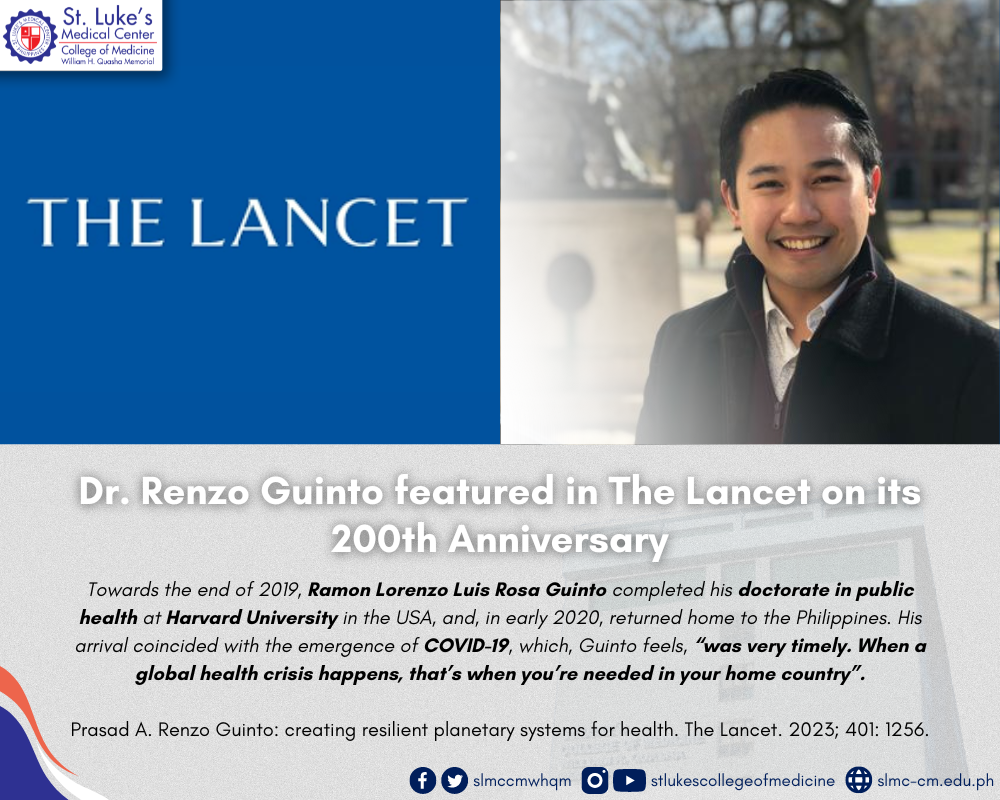News: Dr. Renzo Guinto featured in The Lancet on its 200th Anniversary
| April 17, 2023

Dr. Renzo Guinto, an Associate Professor of the Practice of Global Public Health and the Inaugural Director of the St. Luke’s Medical Center College of Medicine – William H. Quasha Memorial’s Planetary and Global Health Program, was featured in The Lancet on its 200th Anniversary.
Read the full article here.
The following article was originally posted in The Lancet.
Written by Aarathi Prasad
Renzo Guinto: creating resilient planetary systems for health
Towards the end of 2019, Ramon Lorenzo Luis Rosa Guinto completed his doctorate in public health at Harvard University in the USA, and, in early 2020, returned home to the Philippines. His arrival coincided with the emergence of COVID-19, which, Guinto feels, “was very timely. When a global health crisis happens, that’s when you’re needed in your home country”. In 2012, Guinto had graduated with a medical degree from the University of the Philippines, Manila, under its accelerated programme. Originally drawn to a career in law, he had been inspired by issues of social justice, and particularly by José Rizal, who was executed in 1896 for inspiring the resistance against the Spanish Empire that later led to Philippine independence. “I grew up in the same town, Calamba. I would always pass by his house when I walked to school. Little did I know I would end up like him, a physician… More than 100 years ago, he was already fighting colonialism, advocating for protecting the natural environment, and addressing the social determinants of health”, he says. These issues have also influenced the path Guinto has followed.
In mid-2020, Guinto became Associate Professor of the Practice of Global Public Health, and Inaugural Director of the Planetary and Global Health Program of the St Luke’s Medical Center College of Medicine, Quezon City, the Philippines, the first programme of its kind in the country. “Going back to that initial desire to become a lawyer, I’m reminded of what Rudolf Virchow once said, that physicians are the natural attorneys of the poor. I see my work now as really lawyering for society and the planet”, he says. Justice and equity are central to his work, including the “decolonisation of global health, and articulating the importance of respectful, meaningful, and inclusive engagement with the Global South, and with people of colour”. His focus is on building planetary health in the south and southeast Asia region, including “a network of planetary health advocates, scholars, leaders, young people in the Philippines, because building a community, domestically and regionally, allows us to co-create and share ideas, lessons, good practices, and innovations—not only for ourselves but even for the rest of the world”. Interdisciplinarity is also important: “We need to remember”, he says, “that people, communities, are affected by climate change, but they are also affected by other issues, all happening at the same time. And so we cannot compartmentalise the different stressors, and instead need to adopt a more holistic view of people’s lived experience of mental and emotional stress in these complex times.” He emphasises the importance of lived experience, because “people experience climate change, racism, all these problems in many different ways…because of this interplay of culture, context, geography, and socioeconomic status”.
In seeking change for his communities, he describes himself as a “pracademic”: a practitioner-academic and activist. As such, the programme he leads at St Luke’s covers “education, research, and advocacy”. The education element is “about bringing climate change and planetary health into medical education, but also includes the education of all health professionals. Just last year, we pioneered the first certificate course on climate smart health care for hospital leaders and public health professionals in low- and middle-income countries, and this year, we just launched an online climate change and planetary health course that brings together Filipino and Dutch medical students. We’ve been trying to innovate in this exciting new space.” Guinto is honoured that the planetary and global health programme he founded at St Luke’s received the inaugural Consortium of Universities for Global Health-Velji Planetary Health Innovation Award in April, 2023.
For Guinto, the need for innovation is urgent. “We cannot just keep on training doctors and doing clinical service… We also need to contribute to these bigger, broader issues. The Philippines is one of the top-ranking countries when it comes to climate risks. But climate and health research is…still limited in the country. There’s a need for more scholarship, but scholarship that is done differently, that engages meaningfully with communities, that emphasises context and culture, rather than a simple replication of a western study in the Philippines. Because we need to come up with evidence that meets our needs, that will be useful for future policy and planning in our country. It’s really imperative for the health sector in my country, specifically, to brace itself for the climate impacts to human health, to population health.”
Guinto sits on the National Panel of Technical Experts of the Philippine Climate Change Commission, advising the Philippine Government “on the latest climate science, and how such science can inform future policies and actions. Whatever we find through research or through our engagement with communities, we make sure that that’s heard by the policy makers.” His work with communities has shown him that connecting climate and health justice requires seeking deeper, more nuanced solutions. “It’s about making health systems more resilient and sustainable, but also creating planetary systems for health that involve other sectors. It’s easy for us to prescribe clinical interventions”, he says, “to just give some pills, or provide counselling…when in fact the mental and emotional trauma that Filipinos are experiencing in this era of COVID-19 and climate change is rooted in structural problems, including colonial and commercial determinants, that require structural solutions— rearrangement of power and reorganisation of society. And therein is the importance of engaging with politics, political advocacy, speaking truth to power, and being courageous.”

